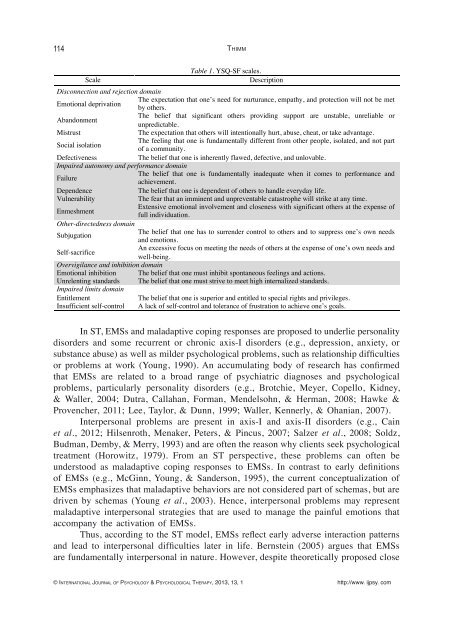wkfHD6mD
wkfHD6mD
wkfHD6mD
Create successful ePaper yourself
Turn your PDF publications into a flip-book with our unique Google optimized e-Paper software.
114<br />
Thimm<br />
Scale<br />
Disconnection and rejection domain<br />
Table 1. YSQ-SF scales.<br />
Description<br />
Emotional deprivation<br />
The expectation that one’s need for nurturance, empathy, and protection will not be met<br />
by others.<br />
Abandonment<br />
The belief that significant others providing support are unstable, unreliable or<br />
unpredictable.<br />
Mistrust The expectation that others will intentionally hurt, abuse, cheat, or take advantage.<br />
Social isolation<br />
The feeling that one is fundamentally different from other people, isolated, and not part<br />
of a community.<br />
Defectiveness The belief that one is inherently flawed, defective, and unlovable.<br />
Impaired autonomy and performance domain<br />
Failure<br />
The belief that one is fundamentally inadequate when it comes to performance and<br />
achievement.<br />
Dependence The belief that one is dependent of others to handle everyday life.<br />
Vulnerability The fear that an imminent and unpreventable catastrophe will strike at any time.<br />
Enmeshment<br />
Other-directedness domain<br />
Extensive emotional involvement and closeness with significant others at the expense of<br />
full individuation.<br />
Subjugation<br />
The belief that one has to surrender control to others and to suppress one’s own needs<br />
and emotions.<br />
Self-sacrifice<br />
An excessive focus on meeting the needs of others at the expense of one’s own needs and<br />
well-being.<br />
Overvigilance and inhibition domain<br />
Emotional inhibition The belief that one must inhibit spontaneous feelings and actions.<br />
Unrelenting standards<br />
Impaired limits domain<br />
The belief that one must strive to meet high internalized standards.<br />
Entitlement The belief that one is superior and entitled to special rights and privileges.<br />
Insufficient self-control A lack of self-control and tolerance of frustration to achieve one’s goals.<br />
In ST, EMSs and maladaptive coping responses are proposed to underlie personality<br />
disorders and some recurrent or chronic axis-I disorders (e.g., depression, anxiety, or<br />
substance abuse) as well as milder psychological problems, such as relationship difficulties<br />
or problems at work (Young, 1990). An accumulating body of research has confirmed<br />
that EMSs are related to a broad range of psychiatric diagnoses and psychological<br />
problems, particularly personality disorders (e.g., Brotchie, Meyer, Copello, Kidney,<br />
& Waller, 2004; Dutra, Callahan, Forman, Mendelsohn, & Herman, 2008; Hawke &<br />
Provencher, 2011; Lee, Taylor, & Dunn, 1999; Waller, Kennerly, & Ohanian, 2007).<br />
Interpersonal problems are present in axis-I and axis-II disorders (e.g., Cain<br />
et al., 2012; Hilsenroth, Menaker, Peters, & Pincus, 2007; Salzer et al., 2008; Soldz,<br />
Budman, Demby, & Merry, 1993) and are often the reason why clients seek psychological<br />
treatment (Horowitz, 1979). From an ST perspective, these problems can often be<br />
understood as maladaptive coping responses to EMSs. In contrast to early definitions<br />
of EMSs (e.g., McGinn, Young, & Sanderson, 1995), the current conceptualization of<br />
EMSs emphasizes that maladaptive behaviors are not considered part of schemas, but are<br />
driven by schemas (Young et al., 2003). Hence, interpersonal problems may represent<br />
maladaptive interpersonal strategies that are used to manage the painful emotions that<br />
accompany the activation of EMSs.<br />
Thus, according to the ST model, EMSs reflect early adverse interaction patterns<br />
and lead to interpersonal difficulties later in life. Bernstein (2005) argues that EMSs<br />
are fundamentally interpersonal in nature. However, despite theoretically proposed close<br />
© InternatIonal Journal of Psychology & PsychologIcal theraPy, 2013, 13, 1 http://www. ijpsy. com












